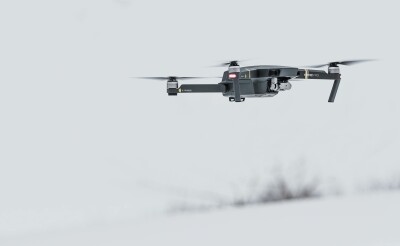At Commercial UAV News, we are always discussing how we can mature and grow the drone industry. One of the most promising approaches to rapidly developing the drone ecosystem has been through the development of open-source systems. Open source provides the foundational support for manufacturers and developers to leverage a proven operating system to build purpose-built products for their end users—without the learning curve.
One of the companies that has been leading the charge for open source is Auterion, and with all the news and growth coming from Auterion, it is clear this vision is beginning to catch on. In their latest announcement, Cynthia Huang, former Director of Business Development at DJI, has joined Auterion as their new VP of Enterprise Business Development. This news only continues to emphasize just how much the industry is seeing the value of the open-source paradigm.
In an exclusive interview with Commercial UAV News, Huang answered questions about why she joined Auterion, what an open-source ecosystem can do for the industry, what is next, and more.
Danielle Gagne: What attracted you to this position at Auterion, especially in light of Auterion’s growth and how it may impact the future of the industry?
Cynthia Huang: I think one thing to look at is just the impressive growth of the drone industry itself. COVID put some things to a screeching halt but it has also accelerated the adoption of drones and the industry in a lot of ways that wouldn’t have been possible otherwise. This has resulted in a very sharp increase in demand for drones and drone technology that outpaces what a single manufacturer, even one as dominant as DJI, is really able to keep up with.
One of the major selling points for me for joining Auterion is that it is not just one company trying to address everything and do everything itself. I think Auterion is being very smart about approaching the different demands in the space and working on creating an ecosystem that tries to tackle all of these problems together.
In a recent press release you state that you “share a common vision of customizable open systems for every customer.” Can you give some examples of how you envision that playing out in the enterprise?
When we say enterprise, it’s comprised of so many different workflows, industries, and use cases that it gets overwhelming if you think about all the different ways drones are adding value all around the world. When you look at a single manufacturer or product, being able to address all of the needs in all of those different workflows and verticals, the expectation that it will perform 100% is just not realistic. Optimistically, it may get 50% to 70% of what each workflow needs right. This leads to a lot of gaps in terms of where that technology could go for the end customer to derive value from it.
An ecosystem is really interesting because you aren’t putting all your eggs in one basket. You are not hoping for one specific enterprise drone to come in and save the day and solve all the problems for public safety, as well as construction, agriculture, energy, and so on. Instead, you are pushing toward a future where you have an ecosystem that can be empowered to make those last mile solutions for whichever specific target vertical it wants to support.
This enables a lot more rapid customization and solution development for specific verticals who are currently left trying to make the best of things with a generic drone that’s meant not just for their vertical, but for everyone’s. With open-source systems, you aren’t constrained by one company’s product or revenue strategy, instead you have a multitude of different companies who are becoming experts, driving support into their niche markets that are high value and very specific to what they do.
What is the significance of open systems for the future of the industry?
I think open systems are really exciting for the future of the industry because you’re able to open up the floodgates of innovation. You can more rapidly address the demands of what the market wants today, and more rapidly bring that to market. Then the market can turn around and iterate on what they’re doing and give more demands, which in turn pushes developers and hardware to keep innovating to keep up with demands.
When you have that kind of rapid pace of feedback, you have an ecosystem that is empowered to respond in a nimble and specific fashion. Then you’re really looking at a future where all the solutions coming to market are intentionally designed to address a very specific demand or vertical. I think that is going to fuel more rapid growth in the industry than what we are seeing today.
Because everything is operating off of an open system these products will have an operating foundation, so essentially the industry doesn’t have to start from scratch, is that correct?
Exactly. Because the ecosystem is to a large degree powered by one central starting point—it is all powered by Auterion—you can always take advantage of the best solutions and the next iteration of products without having to start from scratch and reset that learning curve. The manufacturers and developers don’t have to start from scratch every time they make a new solution, and the customers don’t have to start from scratch every single time they decide to buy into or leverage a new solution.
What are the next steps for you and Auterion?
I think there is a lot of work to be done. We’ve already hit that tipping point where the demand outweighs what the market is able to provide today. A lot of it will be about opening things up as rapidly as possible so that we can onboard this new and evolved ecosystem to start creating solutions. We also need to educate the industry on what is actually possible for the future, if they were to adopt an open-source ecosystem.
I think there is a lot of psychology that permeates the industry today. You have one or a handful of drone manufacturers that are so prominent that it is very hard for customers to step away from that and look at the future of the technology from the perspective of an ecosystem.
With the singular product perspective, you’re always going to be frustrated with the launch of the next product, because it is never going to be 100% what you need. But if you start looking at the future as one that operates within this ecosystem, then there’s a lot of hope that there will one day be a company out there working to support what you’re specifically doing. A company that can give you a product you actually want in a way that you can adopt, without having to go through the learning process all over again.
This is the value of open-source systems like Auterion; not only can industry rapidly evolve to meet the demand of a market without asking customers to relearn a system, but the industry can also provide solutions that meet 100% of the end user’s criteria. This could help define use cases and markets that we haven’t realized yet in today’s market and better serve existing ones.
















Comments